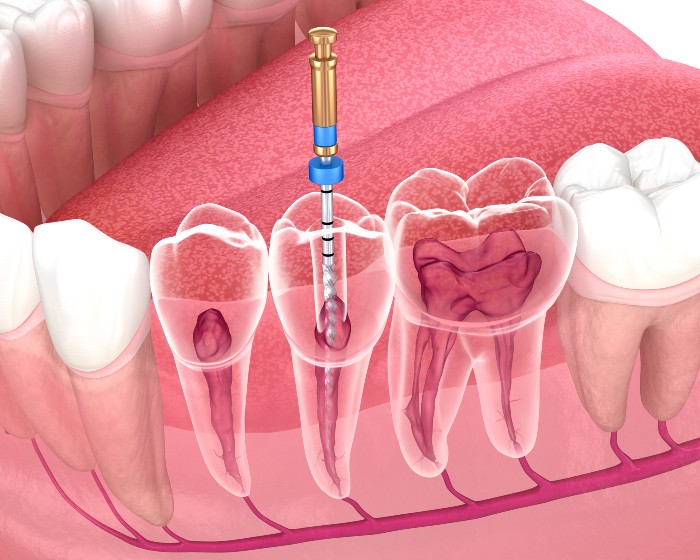Endodontics Specialists in Denver, CO
Dental Endodontics in Denver, CO
If you have an injury or infection that affects your tooth pulp, or the nerves, tissues, and blood vessels inside your tooth, you will likely be referred to an endodontics dentist. Endodontics specialists focus on diagnosing and treating the complex causes of tooth pain. At Reiser Dental, Dr. Reiser is a knowledgeable, compassionate endodontics specialist in Denver, CO. He provides personalized patient care dedicated to saving your natural teeth, even if they are severely decayed or damaged.

What Is an Endodontist?
An endodontist is a highly trained dental specialist who has undergone extensive education and training in repairing the dental pulp, or tissues, inside the tooth. These specialists can diagnose, evaluate, and treat many complex dental problems, including tooth pain, dental abscesses, and infections. Their primary goal is to save the natural tooth whenever possible rather than doing a tooth extraction. A common procedure they use to preserve the natural tooth, eliminate infection, and relieve pain is a root canal procedure.
The Difference Between an Endodontist & General Dentist
General dentists are skilled and experienced in providing general dental care, including routine dental exams, tooth cleanings, and oral health screenings. Endodontists complete three additional years of education in an advanced program in order to become specialists in diseases of the dental pulp. Because they focus exclusively on conditions affecting dental pulp, they are skilled specialists in finding the underlying cause of tooth pain and identifying a solution that preserves the natural tooth. Endodontics specialists are also experts in pain management and use cutting-edge technologies to improve their endodontics treatments’ comfort, safety, and efficacy.
What Do Endodontists Do?
Endodontics specialists have advanced training in diagnosing and treating diseases and tissues that affect the dental pulp. They focus on relieving pain and finding alternatives to tooth extraction. They evaluate common causes of damaged tooth pulp and root issues, including:
- Dental Decay – Tooth decay occurs when bacteria begin to eat away at the dental pulp, eventually causing infection and inflammation.
- Tooth Injuries – Tooth injuries resulting from trauma require quick intervention to save the tooth and avoid the need for extraction.
- Dental Abscesses – When bacteria infiltrates your tooth or gums, it can create a buildup of pus, eventually forming an abscess. Without treatment, this infection can spread throughout your bloodstream.
- Broken, Damaged, or Cracked Teeth – Broken, cracked, and damaged teeth are weak and more likely to require extraction. They also are more susceptible to bacteria and infection.
Endodontic Treatments & Procedures
The endodontic treatment recommended will depend on the underlying cause of your tooth pain and/or infection. Endodontics specialists primarily perform root canal procedures; however, they are also highly skilled and experienced in other dental endodontics treatments:
- Tooth extractions
- Root canal therapy
- Endodontic surgery
- Dental implant surgery
- Emergency dental surgery
- Endodontics retreatment
Tooth Structure Overview
Each tooth consists of cementum, dentin, enamel, and pulp tissue. The exposed portion of the tooth is called the dental crown, and the portion in the gum tissue is called the tooth root. Inside the tooth is a dental pulp cavity containing the nerve, blood vessels, and tissues. The cementum is the surface of the tooth root, which absorbs impact and force from the jaw. The periodontal ligament, a fibrous tissue, connects the cementum and alveolar bone. The alveolar bone, gums, and the periodontal ligament support the entire tooth. Each tooth is covered in enamel, which is a hard surface that protects the tooth. The dentin is the tissue that covers the tooth from the dental crown to the tooth root.
When to See an Endodontist
You should see an endodontist if you have severe or persistent tooth pain, have damaged or injured your tooth, suspect you have an infected tooth or are sensitive to hot or cold. Your dentist may refer you to an endodontic specialist if you have severe tooth decay and need a root canal or other endodontic treatment.
How to Get Rid of a Tooth Infection
If you suspect you have a tooth infection, you should visit your dentist or an endodontist immediately. Infections can spread quickly. If an infection spreads to your bloodstream, it can affect your organs and put your life at risk. If your dentist or endodontist isn’t available, you can go to the emergency room. Your endodontist will treat the infection by draining any pus or abscess, treating the area with an antibiotic gel, pulling the infected tooth, or performing a root canal procedure.
Is Endodontic Surgery Painful?
Your endodontist will use a local anesthetic to numb the area before treatment so you won’t feel pain. He may also give you an anti-anxiety medication to calm your nerves. While you may feel pressure or discomfort during the procedure, it will not be painful.
Aftercare for Endodontic Treatment
You will receive specific aftercare instructions from your endodontic specialist and his team, depending on the procedure or endodontic treatment you undergo. You may be prescribed pain medication and/or antibiotics. You may be instructed to take over-the-counter anti-inflammatory pain medication like Aleve or Advil. You will likely be instructed to eat soft foods, avoid alcohol and nicotine, and not use a straw. You can also treat pain and swelling with ice or a cold compress. You will probably be able to return to your normal activities in one to two days.
Schedule an Appointment With an Endodontics Dentist
If you have unexplained tooth pain, you may want to visit an endodontic specialist in Denver, CO. Call us or contact us online at Reiser Dental to schedule a dental exam or dental x-rays. Dr. Reiser can quickly determine the underlying cause of your tooth pain or tooth sensitivity and recommend a safe, effective solution.
